【专项复习】小升初英语课件-核心考点 题型专项突破:专题 04 时态 第一讲 一般现在时 全国通用版(共43张PPT)
文档属性
| 名称 | 【专项复习】小升初英语课件-核心考点 题型专项突破:专题 04 时态 第一讲 一般现在时 全国通用版(共43张PPT) |
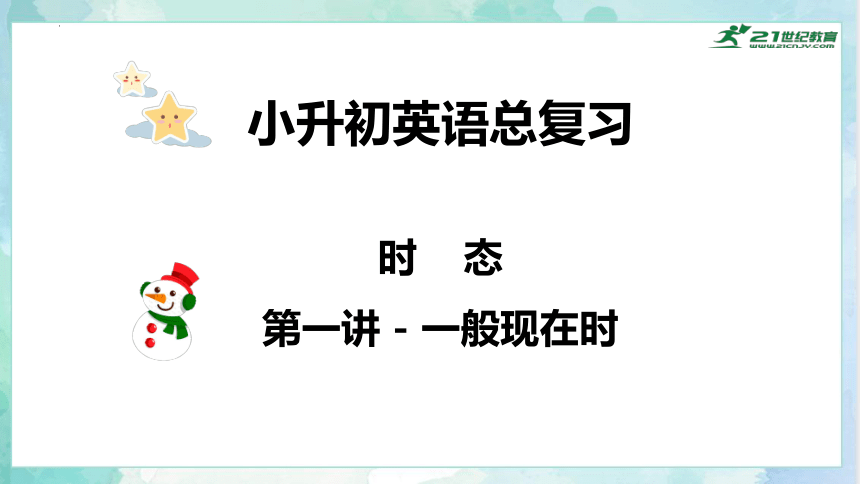
|
|
| 格式 | pptx | ||
| 文件大小 | 2.6MB | ||
| 资源类型 | 试卷 | ||
| 版本资源 | 通用版 | ||
| 科目 | 英语 | ||
| 更新时间 | 2023-05-05 00:00:00 | ||
图片预览

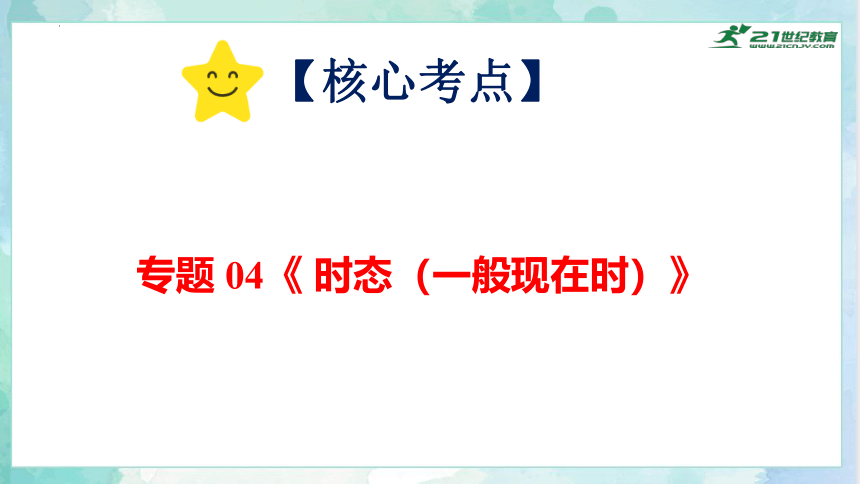
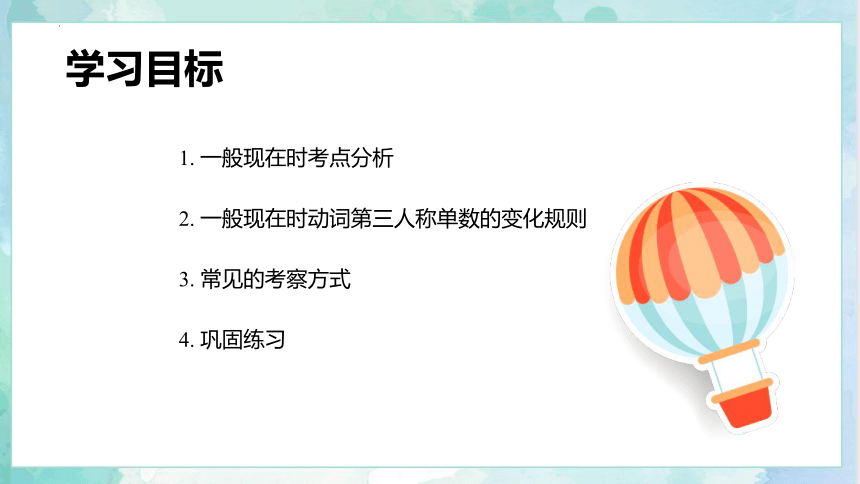
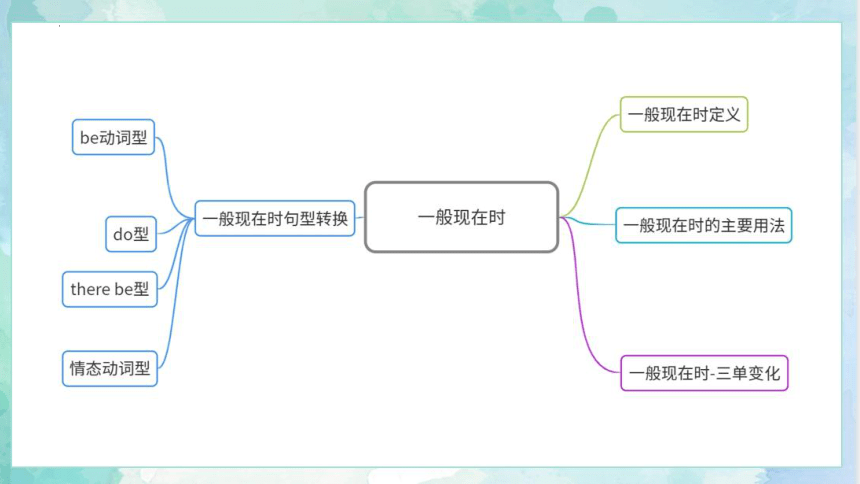
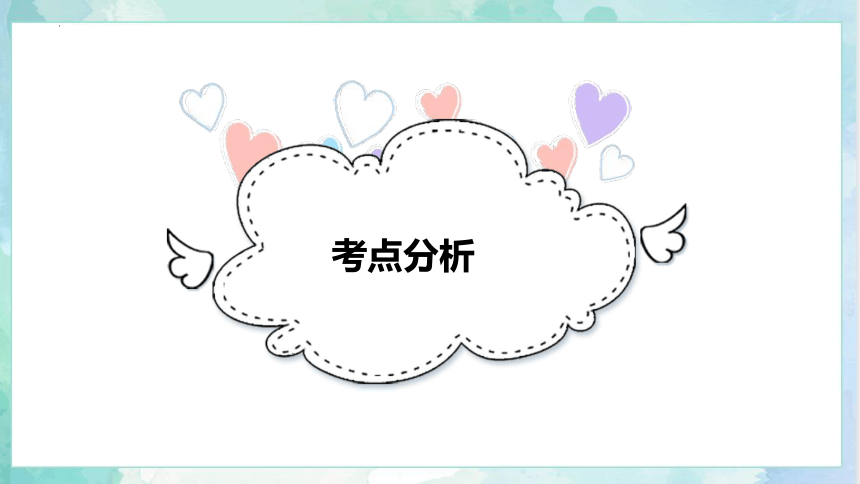
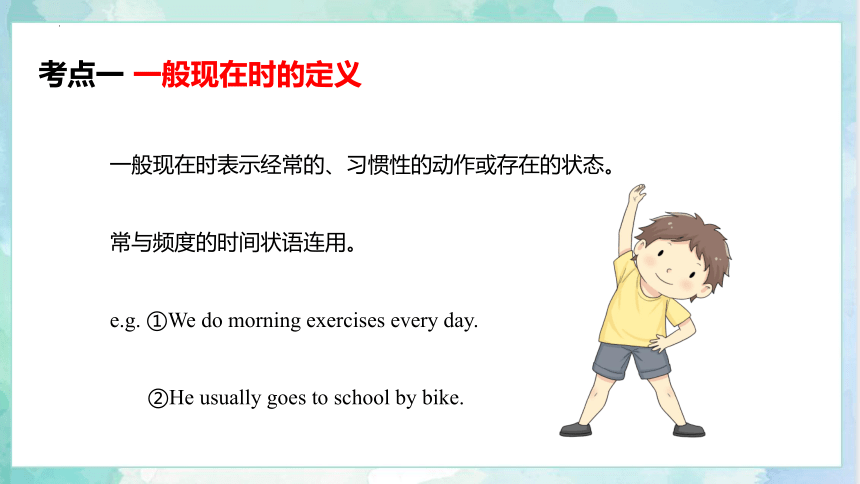
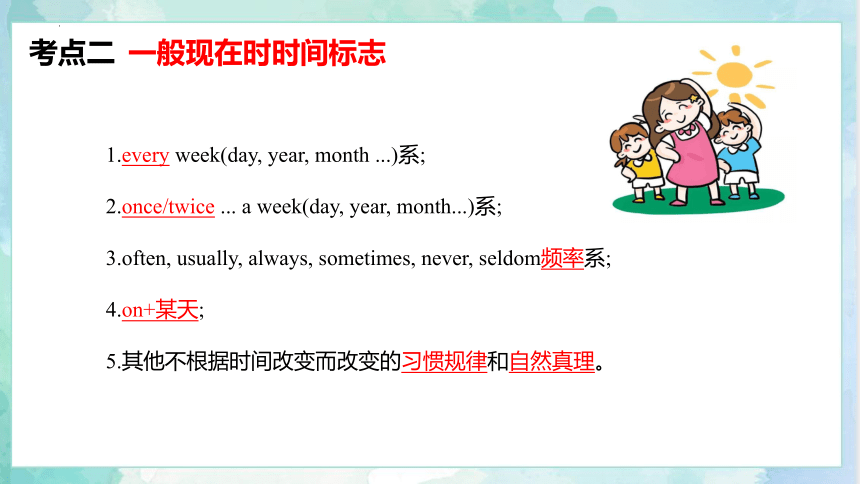
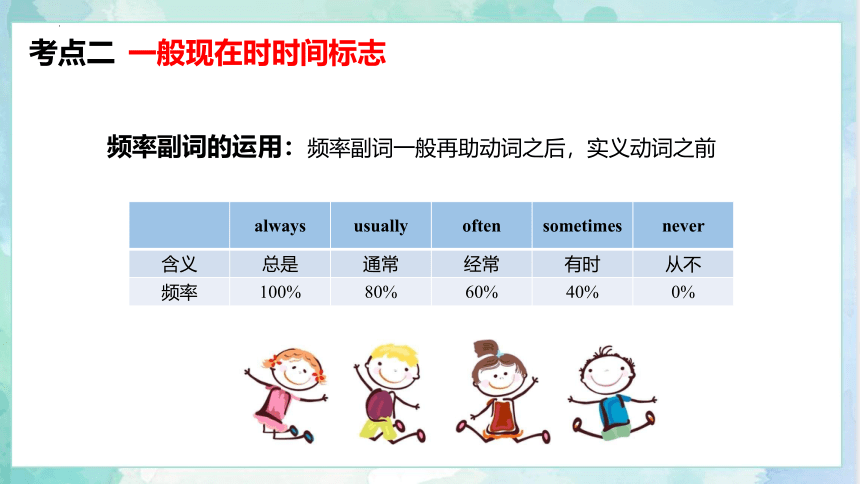
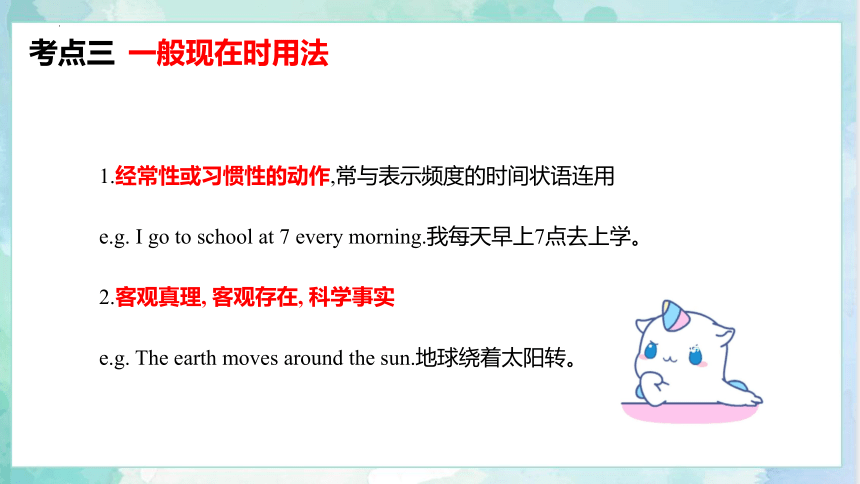
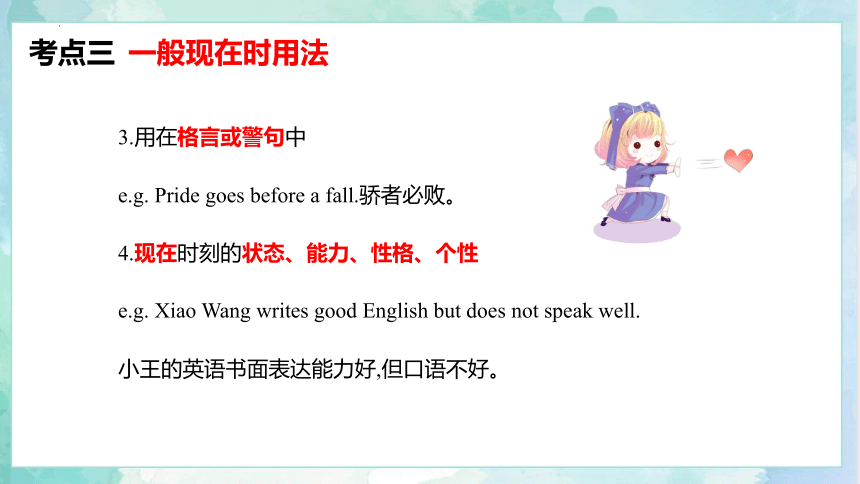
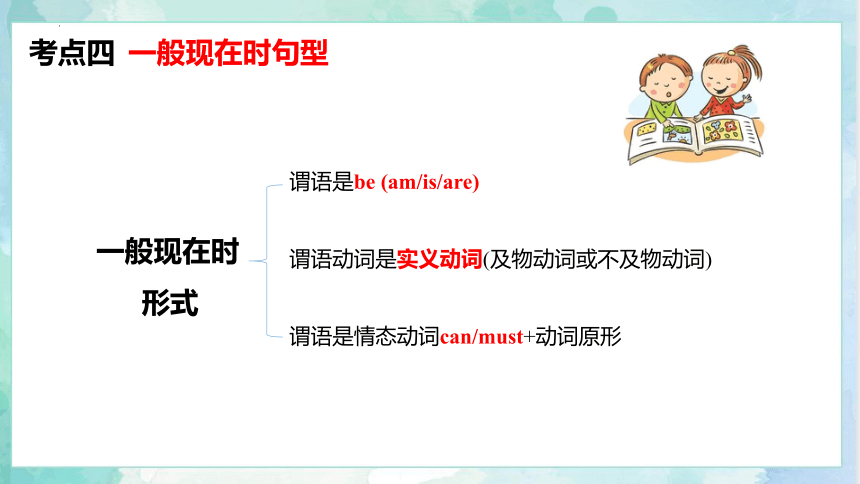
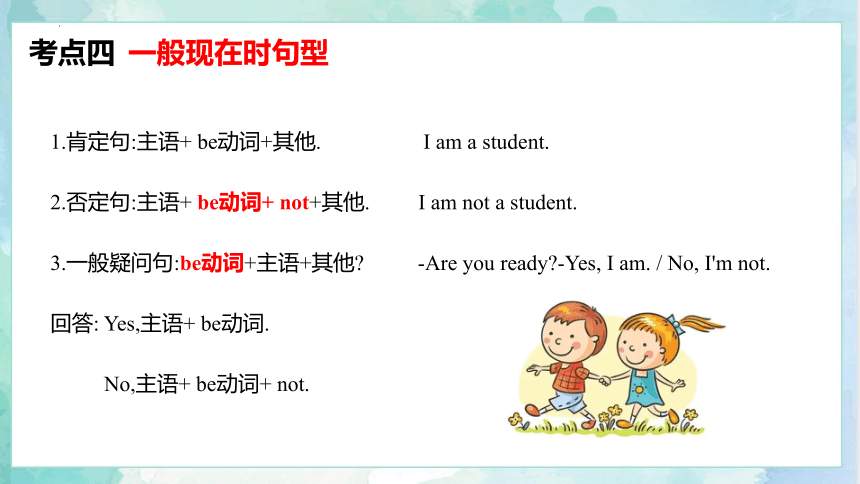
文档简介
(共43张PPT)
小升初英语总复习
时 态
第一讲 - 一般现在时
【核心考点】
专题 04《 时态(一般现在时)》
学习目标
1. 一般现在时考点分析
2. 一般现在时动词第三人称单数的变化规则
3. 常见的考察方式
4. 巩固练习
考点分析
考点一 一般现在时的定义
一般现在时表示经常的、习惯性的动作或存在的状态。
常与频度的时间状语连用。
e.g. ①We do morning exercises every day.
②He usually goes to school by bike.
1.every week(day, year, month ...)系;
2.once/twice ... a week(day, year, month...)系;
3.often, usually, always, sometimes, never, seldom频率系;
4.on+某天;
5.其他不根据时间改变而改变的习惯规律和自然真理。
考点二 一般现在时时间标志
考点二 一般现在时时间标志
频率副词的运用:频率副词一般再助动词之后,实义动词之前
always usually often sometimes never
含义 总是 通常 经常 有时 从不
频率 100% 80% 60% 40% 0%
1.经常性或习惯性的动作,常与表示频度的时间状语连用
e.g. I go to school at 7 every morning.我每天早上7点去上学。
2.客观真理, 客观存在, 科学事实
e.g. The earth moves around the sun.地球绕着太阳转。
考点三 一般现在时用法
3.用在格言或警句中
e.g. Pride goes before a fall.骄者必败。
4.现在时刻的状态、能力、性格、个性
e.g. Xiao Wang writes good English but does not speak well.
小王的英语书面表达能力好,但口语不好。
考点三 一般现在时用法
谓语是be (am/is/are)
谓语动词是实义动词(及物动词或不及物动词)
谓语是情态动词can/must+动词原形
一般现在时
形式
考点四 一般现在时句型
1.肯定句:主语+ be动词+其他. I am a student.
2.否定句:主语+ be动词+ not+其他. I am not a student.
3.一般疑问句:be动词+主语+其他 -Are you ready -Yes, I am. / No, I'm not.
回答: Yes,主语+ be动词.
No,主语+ be动词+ not.
考点四 一般现在时句型
1.肯定句:主语+动词原形/第三人称单数动词+其他.
2.否定句:主语+ don't/doesn't +动词原形+其他.
3.一般疑问句:Do/Does+主语+动词原形+其他
肯定回答: Yes,主语+ do/does.
否定回答: No,主语+don't/doesn't.
I teach English.
Miss White teaches English.
I don't teach English.
She doesn't teach English.
Do you/Does Miss White teach English
考点四 一般现在时句型
1.肯定句: There+ be动词+其他. There is an apple on the desk.
2.否定句: There + be动词+ not+其他. There isn't an apple on the desk.
3.一般疑问句: be动词+there+其他 -Are there any apples
回答: Yes, there is/are. -Yes, there are./No, there aren't.
No, there isn't/aren't.
考点四 一般现在时句型
考点四 一般现在时句型
1.肯定句:主语+情态动词+动词原形+其他. I can swim in the sea.
2.否定句:主语+情态动词+ not+动词原形+其他. I can't swim in the sea.
3.一般疑问句:情态动词+主语+动词原形+其他 -Can you swim
回答: Yes,主语+情态动词. -Yes, I can. / No, I can't.
No,主语+情态动词+ not.
人称 第一人称 第二人称 第三人称 数 单数 复数 单数 复数 单数 复数 单数 复数
主格 I we you you he she it they
宾格 me us you you him her it them
中文 我 我们 你 你们 他 她 它 他/她/它们
主语为单数第三人称的一般现在时
第三人称单数是语言中对话双方外其它某一个人。(简称三单)
考点五 动词第三人称单数
人称代词 he, she, it
this / that / the/ an/a +单数名 orange, apple, book
单个人名、地名、称呼 Jack, China, Uncle Wang
不可数名词 bread, milk, water
主语为单数第三人称的一般现在时
单三人称的
主语可以是:
考点五 动词第三人称单数
I do my homework every day.
He does his homework every day.
tips:主语为第三人称单数时,谓语动词要用三单。
三单变化
考点五 动词第三人称单数
动词第三人称单数形式
考点五 动词的第三人称单数
规则 动词原形 第三人称单数形式
一般在动词词尾加 s play sing plays
sings
以ch,sh,s,x,o结尾的动词加 es teach wash go teaches
washes
goes
以辅音字母加y结尾的动词,先变y为i,再加 es cry study cries
studies
① 找时间标志词,判断时态【一般现在时】
② 找主语,判断是否需要进行动词变化
考点六 解题方法
1. 填空、选择解题两步走
① 含有be 动词以及情态动词的句型转化
肯定句:主语+am/is/are/情态动词+其他.
She is beautiful./ She can sing.
否定句:主语+am/is/are/情态动词+not+其他.
She___________ beautiful./She ________ sing.
一般疑问句: Am/Is/Are/情态动词+主语+其他?
_____ she beautiful / ______ she sing
考点六 解题方法
2. 句型转换解题技巧
is not (isn’t)
can’t
Is
Can
解题方法:
1.肯定句改为否定句 :
在be动词或情态动词后+ not
2. 肯定句改为一般疑问句:
Be动词或情态动词 提前
② 含有实义动词的句型转化
肯定句:主语+动词原形或第三人称单数形式+其他.
She likes reading.
否定句:主语+助动词do/does+not+动词原形+其他.
She ____________ _________ reading.like
一般疑问句:助动词Do/Does+主语+动词原形+其他
________ she _______ reading
考点六 解题方法
2. 句型转换解题技巧
does not (doesn’t)
like
Does
like
解题方法:
1.肯定句改为否定句 :
在实义动词之前加助动词do/does +not;
实义动词改为原形
2. 肯定句改为一般疑问句:
句首加助动词do/does ;
实义动词改为原形
请记住句型转换注意事项:
当句中没有be动词或情态动词时,
在主语前加助动词do/does变一般疑问句;
在主语后谓语动词前加助动词don't/doesn't
变否定句,助动词后的动词要变为动词原形。
考点六 解题方法
2. 句型转换解题技巧
例 题 精 讲
【例1】My mother ______ milk before going to bed every evening.
A. drink B. drinks C. to drink D. drinking
思路点拨:结合every evening可知表达的是习惯性动作,故用一般现在时,主语my mother三单,故drinks,故答案是B.
答案:B、
例题解析
【例2】Miss. Li is a new _________. She ________ us English.
A. teaches; teaches B. teacher; teach
C. teaches; teacher D. teacher; teaches
思路点拨:句意:Miss. Li是一位新老师,他教我们英语。teacher名词,老师;teach动词,教。第一个空是名词。排除AC,第二个空是动词,主语是第三人称单数,谓语动词变第三人称单数。排除B。
根据题意,故选,D
例题解析
思路点拨:本题考察一般现在时,由on Mondays可知这件事是每个星期一发生的,主语是we,否定词应为don't,故选B。
例题解析
【例3】We _____ TV on Mondays.
A. didn't watch B. don't watch C. doesn't watch.
【例4】 Su Yang sometimes ______ in the park.
A. flys kites B. flies kites C. flies kite
思路点拨:该题考查动词短语.根据sometimes判断该句为一般现在时,主语Su Yang是第三人称单数,故谓语动词要变为单三形式.fly的第三人称单数形式是flies,该句用复数形式kites.故选:B.
例题解析
【例5】
1. His father is a kind man. He often _______(help) others.
2. My brother ________ (play) computer every day.
3. Sometimes Tony __________(have) lunch at home.
答案:1. helps 2. plays 3. has
例题解析
例题解析
思路点拨:
第一题句意:他父亲是个善良的人。他经常帮助别人。主语是He,故谓语填helps.
第二题句意:我的哥哥每天都在玩电脑。根据句意以及时间状语every day可知,此句应用一般现在时。主语是第三人称单数,故填plays。
第三题句意:有时Tony在家出午饭。由sometimes可知句子是用一般现在时态,而主语Tony是第三人称单数,故填has。
【例 6 】 I _____ two baseballs and my friend ____ five baseballs.
A. have; have B. has; has
C. has; have D. have; has
思路点拨:我有两个棒球,我的朋友有五个棒球。根据two baseballs and my friend fivebaseballs.可知句子叙述一件事实,时态用一般现在时,1后面用have,而my friend 是单数,所以用has。故选D。
例题解析
【例 7】I don't ____ junk food _____ cakes and candy. They are not good for us.
A. like; like B. likes; likes
C. likes; like D. like; likes
思路点拨:本题考查like的用法。句意:我不喜欢垃圾食品,比如蛋糕和糖果。它们对我们不好。动词like意为"喜欢";介词like意为"像… 一样",用来举例子。助动词don't后跟动词原形;like做介词时,形式不变。故选A
例题解析
【例 8 】 -Do you watch TV at home
-No, I _____ watch TV because I think it's boring.
A. always B. usually
C. never D. sometimes
思路点拨:A.always总是; B.usually通常; C.neverAT; D.sometimes有时;根据No,和because I think it'sboring.可知我从不看电视。故选C。
例题解析
【例 9 】- _______ she ______ lunch at school
-Yes, she ________.
A. Do, have, do B. Does, have, has
C. Does, has, does D. Does, have, does
答案:D
例题解析
思路点拨:
句意:--她在学校吃午饭吗?--是的。考查一般疑问句和动词形式。do作为助动词时无实际意义,用于实义动词前构成疑问句,也可以代替实义动词以避免重复,does是do的第三人称单数形式;have吃(饭),has是have的第三人称单数形式。根据回答部分yes,可知此处是一般疑问句,主语she是第三人称单数形式,所以用助动词does,主语she后面的动词使用原形have;答句中是肯定回答,即She has lunch at school.此时为了避免动词has重复,可以用does代替。故选D。
例题解析
【例 10 】 Alice does her homework every evening. (改为否定句)
Alice ________ _______ her homework every evening.
思路点拨:含有实意动词的一般现在时的句子,变为否定句时要使用助动词don't或doesn't,动词是第三人称单数的要还原成原形。
答案: doesn't ; do
例题解析
【例 11 】He always takes the bus and subway to work. (改为一般疑问)
_______ he always _______ the bus and subway to work
例题解析
思路点拨: 含有实意动词的一般现在时的句子,变为一般疑问句时要使用助动词do或does,动词是第三人称单数的要还原成原形。
答案: Does; take
巩 固 练 习
写出所给词的第三人称单数形式
sit swim read make run
write have go do watch
cry study play say wash
sits
swims
reads
makes
runs
writes
has
goes
does
watches
cries
studies
plays
says
washes
用括号内动词的适当形式填空。
1. He often _________ (have) dinner at home.
2. Daniel and Tommy _________ (be) in Class One.
3. We ________________ (not watch) TV on Monday.
4. Nick____________ (not go) to the zoo on Sunday.
5. ______ they _________ (like) the World Cup
6. What they often_________ (do) on Saturdays
7. ______ your parents _________ (read) newspapers every day
has
are
don’t watch
doesn’t go
Do like
do
Do read
用do或does的适当形式填空
1. _____ you ride a bike to school Yes, I ________.
2. ______ your sister like PE No, she ________.
3. What_______ the students have They have some pens.
4. How_______ Linda go to school She goes to school on foot.
5. He _______ not speak English. He speaks Chinese.
6. _______ they watch TV on Sundays Yes, they _______.
7. My father and mother ______ not read newspapers on Saturday.
Do
do
Does
does
do
does
does
Do
do
do
句型转换
1. I go to school by bus. (用He做主语变否定句)
________________________________________
2. Kim plays baseball very well. (变一般疑问句)
________________________________________
3. David doesn’t like learning French. (变肯定句)
________________________________________
4. Alan doesn’t watch TV on school nights. (变肯定句)
________________________________________
Does he go to school by bus
Does Kim plays baseball very well
David likes learning French.
Alan watches TV on school nights.
小升初英语总复习
时 态
第一讲 - 一般现在时
【核心考点】
专题 04《 时态(一般现在时)》
学习目标
1. 一般现在时考点分析
2. 一般现在时动词第三人称单数的变化规则
3. 常见的考察方式
4. 巩固练习
考点分析
考点一 一般现在时的定义
一般现在时表示经常的、习惯性的动作或存在的状态。
常与频度的时间状语连用。
e.g. ①We do morning exercises every day.
②He usually goes to school by bike.
1.every week(day, year, month ...)系;
2.once/twice ... a week(day, year, month...)系;
3.often, usually, always, sometimes, never, seldom频率系;
4.on+某天;
5.其他不根据时间改变而改变的习惯规律和自然真理。
考点二 一般现在时时间标志
考点二 一般现在时时间标志
频率副词的运用:频率副词一般再助动词之后,实义动词之前
always usually often sometimes never
含义 总是 通常 经常 有时 从不
频率 100% 80% 60% 40% 0%
1.经常性或习惯性的动作,常与表示频度的时间状语连用
e.g. I go to school at 7 every morning.我每天早上7点去上学。
2.客观真理, 客观存在, 科学事实
e.g. The earth moves around the sun.地球绕着太阳转。
考点三 一般现在时用法
3.用在格言或警句中
e.g. Pride goes before a fall.骄者必败。
4.现在时刻的状态、能力、性格、个性
e.g. Xiao Wang writes good English but does not speak well.
小王的英语书面表达能力好,但口语不好。
考点三 一般现在时用法
谓语是be (am/is/are)
谓语动词是实义动词(及物动词或不及物动词)
谓语是情态动词can/must+动词原形
一般现在时
形式
考点四 一般现在时句型
1.肯定句:主语+ be动词+其他. I am a student.
2.否定句:主语+ be动词+ not+其他. I am not a student.
3.一般疑问句:be动词+主语+其他 -Are you ready -Yes, I am. / No, I'm not.
回答: Yes,主语+ be动词.
No,主语+ be动词+ not.
考点四 一般现在时句型
1.肯定句:主语+动词原形/第三人称单数动词+其他.
2.否定句:主语+ don't/doesn't +动词原形+其他.
3.一般疑问句:Do/Does+主语+动词原形+其他
肯定回答: Yes,主语+ do/does.
否定回答: No,主语+don't/doesn't.
I teach English.
Miss White teaches English.
I don't teach English.
She doesn't teach English.
Do you/Does Miss White teach English
考点四 一般现在时句型
1.肯定句: There+ be动词+其他. There is an apple on the desk.
2.否定句: There + be动词+ not+其他. There isn't an apple on the desk.
3.一般疑问句: be动词+there+其他 -Are there any apples
回答: Yes, there is/are. -Yes, there are./No, there aren't.
No, there isn't/aren't.
考点四 一般现在时句型
考点四 一般现在时句型
1.肯定句:主语+情态动词+动词原形+其他. I can swim in the sea.
2.否定句:主语+情态动词+ not+动词原形+其他. I can't swim in the sea.
3.一般疑问句:情态动词+主语+动词原形+其他 -Can you swim
回答: Yes,主语+情态动词. -Yes, I can. / No, I can't.
No,主语+情态动词+ not.
人称 第一人称 第二人称 第三人称 数 单数 复数 单数 复数 单数 复数 单数 复数
主格 I we you you he she it they
宾格 me us you you him her it them
中文 我 我们 你 你们 他 她 它 他/她/它们
主语为单数第三人称的一般现在时
第三人称单数是语言中对话双方外其它某一个人。(简称三单)
考点五 动词第三人称单数
人称代词 he, she, it
this / that / the/ an/a +单数名 orange, apple, book
单个人名、地名、称呼 Jack, China, Uncle Wang
不可数名词 bread, milk, water
主语为单数第三人称的一般现在时
单三人称的
主语可以是:
考点五 动词第三人称单数
I do my homework every day.
He does his homework every day.
tips:主语为第三人称单数时,谓语动词要用三单。
三单变化
考点五 动词第三人称单数
动词第三人称单数形式
考点五 动词的第三人称单数
规则 动词原形 第三人称单数形式
一般在动词词尾加 s play sing plays
sings
以ch,sh,s,x,o结尾的动词加 es teach wash go teaches
washes
goes
以辅音字母加y结尾的动词,先变y为i,再加 es cry study cries
studies
① 找时间标志词,判断时态【一般现在时】
② 找主语,判断是否需要进行动词变化
考点六 解题方法
1. 填空、选择解题两步走
① 含有be 动词以及情态动词的句型转化
肯定句:主语+am/is/are/情态动词+其他.
She is beautiful./ She can sing.
否定句:主语+am/is/are/情态动词+not+其他.
She___________ beautiful./She ________ sing.
一般疑问句: Am/Is/Are/情态动词+主语+其他?
_____ she beautiful / ______ she sing
考点六 解题方法
2. 句型转换解题技巧
is not (isn’t)
can’t
Is
Can
解题方法:
1.肯定句改为否定句 :
在be动词或情态动词后+ not
2. 肯定句改为一般疑问句:
Be动词或情态动词 提前
② 含有实义动词的句型转化
肯定句:主语+动词原形或第三人称单数形式+其他.
She likes reading.
否定句:主语+助动词do/does+not+动词原形+其他.
She ____________ _________ reading.like
一般疑问句:助动词Do/Does+主语+动词原形+其他
________ she _______ reading
考点六 解题方法
2. 句型转换解题技巧
does not (doesn’t)
like
Does
like
解题方法:
1.肯定句改为否定句 :
在实义动词之前加助动词do/does +not;
实义动词改为原形
2. 肯定句改为一般疑问句:
句首加助动词do/does ;
实义动词改为原形
请记住句型转换注意事项:
当句中没有be动词或情态动词时,
在主语前加助动词do/does变一般疑问句;
在主语后谓语动词前加助动词don't/doesn't
变否定句,助动词后的动词要变为动词原形。
考点六 解题方法
2. 句型转换解题技巧
例 题 精 讲
【例1】My mother ______ milk before going to bed every evening.
A. drink B. drinks C. to drink D. drinking
思路点拨:结合every evening可知表达的是习惯性动作,故用一般现在时,主语my mother三单,故drinks,故答案是B.
答案:B、
例题解析
【例2】Miss. Li is a new _________. She ________ us English.
A. teaches; teaches B. teacher; teach
C. teaches; teacher D. teacher; teaches
思路点拨:句意:Miss. Li是一位新老师,他教我们英语。teacher名词,老师;teach动词,教。第一个空是名词。排除AC,第二个空是动词,主语是第三人称单数,谓语动词变第三人称单数。排除B。
根据题意,故选,D
例题解析
思路点拨:本题考察一般现在时,由on Mondays可知这件事是每个星期一发生的,主语是we,否定词应为don't,故选B。
例题解析
【例3】We _____ TV on Mondays.
A. didn't watch B. don't watch C. doesn't watch.
【例4】 Su Yang sometimes ______ in the park.
A. flys kites B. flies kites C. flies kite
思路点拨:该题考查动词短语.根据sometimes判断该句为一般现在时,主语Su Yang是第三人称单数,故谓语动词要变为单三形式.fly的第三人称单数形式是flies,该句用复数形式kites.故选:B.
例题解析
【例5】
1. His father is a kind man. He often _______(help) others.
2. My brother ________ (play) computer every day.
3. Sometimes Tony __________(have) lunch at home.
答案:1. helps 2. plays 3. has
例题解析
例题解析
思路点拨:
第一题句意:他父亲是个善良的人。他经常帮助别人。主语是He,故谓语填helps.
第二题句意:我的哥哥每天都在玩电脑。根据句意以及时间状语every day可知,此句应用一般现在时。主语是第三人称单数,故填plays。
第三题句意:有时Tony在家出午饭。由sometimes可知句子是用一般现在时态,而主语Tony是第三人称单数,故填has。
【例 6 】 I _____ two baseballs and my friend ____ five baseballs.
A. have; have B. has; has
C. has; have D. have; has
思路点拨:我有两个棒球,我的朋友有五个棒球。根据two baseballs and my friend fivebaseballs.可知句子叙述一件事实,时态用一般现在时,1后面用have,而my friend 是单数,所以用has。故选D。
例题解析
【例 7】I don't ____ junk food _____ cakes and candy. They are not good for us.
A. like; like B. likes; likes
C. likes; like D. like; likes
思路点拨:本题考查like的用法。句意:我不喜欢垃圾食品,比如蛋糕和糖果。它们对我们不好。动词like意为"喜欢";介词like意为"像… 一样",用来举例子。助动词don't后跟动词原形;like做介词时,形式不变。故选A
例题解析
【例 8 】 -Do you watch TV at home
-No, I _____ watch TV because I think it's boring.
A. always B. usually
C. never D. sometimes
思路点拨:A.always总是; B.usually通常; C.neverAT; D.sometimes有时;根据No,和because I think it'sboring.可知我从不看电视。故选C。
例题解析
【例 9 】- _______ she ______ lunch at school
-Yes, she ________.
A. Do, have, do B. Does, have, has
C. Does, has, does D. Does, have, does
答案:D
例题解析
思路点拨:
句意:--她在学校吃午饭吗?--是的。考查一般疑问句和动词形式。do作为助动词时无实际意义,用于实义动词前构成疑问句,也可以代替实义动词以避免重复,does是do的第三人称单数形式;have吃(饭),has是have的第三人称单数形式。根据回答部分yes,可知此处是一般疑问句,主语she是第三人称单数形式,所以用助动词does,主语she后面的动词使用原形have;答句中是肯定回答,即She has lunch at school.此时为了避免动词has重复,可以用does代替。故选D。
例题解析
【例 10 】 Alice does her homework every evening. (改为否定句)
Alice ________ _______ her homework every evening.
思路点拨:含有实意动词的一般现在时的句子,变为否定句时要使用助动词don't或doesn't,动词是第三人称单数的要还原成原形。
答案: doesn't ; do
例题解析
【例 11 】He always takes the bus and subway to work. (改为一般疑问)
_______ he always _______ the bus and subway to work
例题解析
思路点拨: 含有实意动词的一般现在时的句子,变为一般疑问句时要使用助动词do或does,动词是第三人称单数的要还原成原形。
答案: Does; take
巩 固 练 习
写出所给词的第三人称单数形式
sit swim read make run
write have go do watch
cry study play say wash
sits
swims
reads
makes
runs
writes
has
goes
does
watches
cries
studies
plays
says
washes
用括号内动词的适当形式填空。
1. He often _________ (have) dinner at home.
2. Daniel and Tommy _________ (be) in Class One.
3. We ________________ (not watch) TV on Monday.
4. Nick____________ (not go) to the zoo on Sunday.
5. ______ they _________ (like) the World Cup
6. What they often_________ (do) on Saturdays
7. ______ your parents _________ (read) newspapers every day
has
are
don’t watch
doesn’t go
Do like
do
Do read
用do或does的适当形式填空
1. _____ you ride a bike to school Yes, I ________.
2. ______ your sister like PE No, she ________.
3. What_______ the students have They have some pens.
4. How_______ Linda go to school She goes to school on foot.
5. He _______ not speak English. He speaks Chinese.
6. _______ they watch TV on Sundays Yes, they _______.
7. My father and mother ______ not read newspapers on Saturday.
Do
do
Does
does
do
does
does
Do
do
do
句型转换
1. I go to school by bus. (用He做主语变否定句)
________________________________________
2. Kim plays baseball very well. (变一般疑问句)
________________________________________
3. David doesn’t like learning French. (变肯定句)
________________________________________
4. Alan doesn’t watch TV on school nights. (变肯定句)
________________________________________
Does he go to school by bus
Does Kim plays baseball very well
David likes learning French.
Alan watches TV on school nights.
